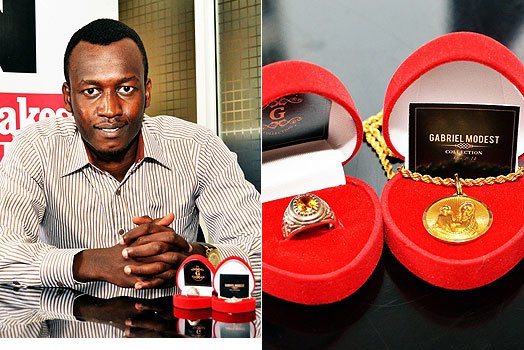BY SYLVANIA AMBANI
Two years ago Gabriel Modest, a mutura (traditional blood sausage) seller in South C, Nairobi, never dreamed that he would one day build a jewelry company that deals in precious stones.
The 24-year-old’s journey to become a successful entrepreneur started in 2013 while at Kenyatta University where he was studying economics and finance.
However, he did not complete the course — juggling school and his mutura business took a toll on his studies.
“I used to miss most of the afternoon classes, because that was the time I used to run to Burma to get the meat, so that by 4pm when everyone is leaving their workplace they pass by my stand of mutura in South C. This made me miss a lot of CATs (continuous assessment tests) hence the total marks couldn’t be added. “And the only way was for me to repeat the whole semester,” he says.
To date, he is yet to graduate from the university because of missing many examinations.
Modest concentrated on his mutura business for five months in 2014, then decided to change his trade to selling new and second hand clothes.
The new business did not last long. The idea of starting a jewellery company hit him as his brother, who lives in Tanzania and owns a mine, started sending him rough gemstones to sell in Kenya around that time.
Mr G collection was born late 2014. Modest designs and customises the jewellery according to the client’s specifications. “It was easier for me to start the company because I have a relative who owns a mine in Tanzania, so getting the gem stones is easy,” he says.
For gemstones to reach Kenya they must pass through a minimum of five brokers, starting from the miners.
After identifying the market he asked a friend, who is a professional handcrafter, to quit his job and join him in his venture — Mr G Collection — on the second floor of the National Bank building on Harambee Avenue in Nairobi, which he terms as a representative office that does not have ready-made items.
Modest says he did not need start-up capital because once the clients identify what they want, he calculates the price and requires them to make a 80 per cent cash deposit, which he works with. And the company operates strictly on orders placed by clients.
“When a client is interested one chooses the gem. I then call my suppliers and see if it is available and price it according to what the client wants — depending on whether it is a necklace, ring or bracelet as well as the workmanship involved.
“The client then pays an 80 per cent deposit and this is the money I use to buy the stone and pay the crafters.”
Once the stone is acquired it is taken to a gemstone cutter where it is cut according to the shape and size agreed upon with the client. It is then taken to a goldsmith or silversmith, based on what the customer wants to hold the gemstone.
After the gemstone has been mounted on the silver or gold it is then polished and engravings done.
He says he made a Sh900,000 profit a year after starting the business. Apart from Kenya, he has clients in Uganda and Rwanda.
So how does a company that operates mainly online gain the trust of clients?
He says: “I mostly depend on my brand ambassadors, as well as word of mouth by the people who I have dealt with helps a lot. It reassures them that I am not a conman but genuine.”









